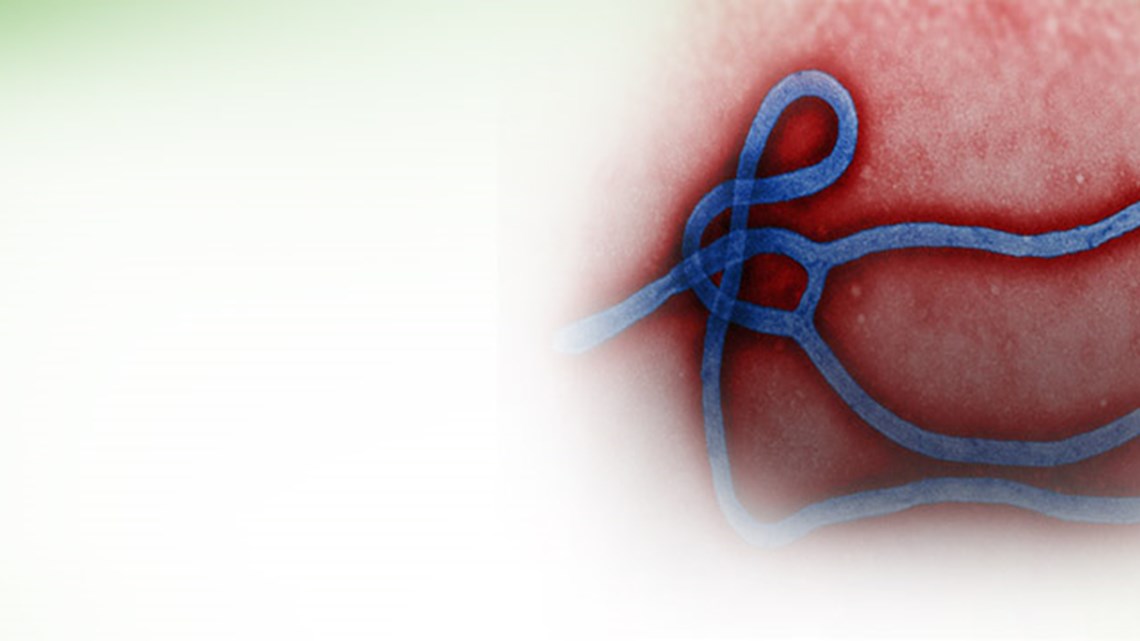Ebola

Ebola, some facts
Find out more about what causes Ebola,
the symptoms and
what treatments are available.
Ebola virus is the cause of a viral haemorrhagic fever. It is an often fatal disease that can infect both humans and non-human primates, such as chimpanzees.
Find out more about what causes Ebola, the symptoms and what steps are available to help prevent it spreading.
The following information has been gathered from the websites of the World Health Organisation and the Centers for Disease Control and Prevention (CDC) in the United States.
Causes
Ebola is the result of an infection by the Ebola virus. There are four known species that can cause harm to humans, all of which originate in Africa.
Ebola is transmitted in the following ways:
- Direct contact with infected animals, their blood and meat products
- Direct contact with the blood, bodily fluids or secretions (faeces, vomit, saliva, urine or semen) of an infected symptomatic person. A person who does not show symptoms is not contagious.
- Direct contact with the organs or body of someone who has died.
Infection occurs if broken skin or mucous membranes such as the eyes, nose or mouth, of a healthy person come into contact with the above or with items or environments that have become contaminated with an Ebola patient's infectious fluids. These include such things as soiled clothing, bed linen or used needles.
Ebola is not an airborne infection neither is it transmitted through water contamination.
Symptoms
Symptoms may appear anywhere from 2 to 21 days after exposure to Ebola virus, though 8-10 days is most common: Symptoms include:
- High fever
- Severe headache
- Extreme tiredness
- Aching joints or muscles
- Sore throat
- Weakness
- Diarrhoea
- Vomiting
- Stomach pain
- Lack of appetite
- Unexplained bleeding or bruising
The early symptoms of Ebola are similar to those of flu (high fever, aching muscles, tiredness, sore throat) so it is possible that people may confuse the symptoms of flu with those of Ebola. Flu is likely to be accompanied by a runny or blocked nose, sneezing and a dry chesty cough. Ebola symptoms will develop to include stomach pain, vomiting , diarrhoea, as well as unexplained bleeding and bruising.
If you are concerned, contact your local health authority or health care professional for further information and advice.
Ebola Prevention Tips
If you are in or travelling to an area affected by the Ebola outbreak, protect yourself by doing the following:
- Wash your hands regularly with soap and water.
- Avoid contact with bodily fluids and blood from any person, especially people who are sick.
- Do not touch items that may have come in contact with the blood or bodily fluids of an infected person.
- Do not touch the body of someone who has died from Ebola.
- Do not touch non-human primates, bats or their body fluids and blood. Also do not touch or eat raw meat prepared from these animals.
- Avoid hospitals where Ebola patients are being treated unless you suspect you are infected with Ebola.
- If you develop a fever and any of the following symptoms (headache, muscle pain, diarrhoea, vomiting, stomach pain, or unexplained bruising or bleeding), seek medical care immediately.
- Limit your contact with other people until and when you go to the doctor. Do not travel anywhere else besides a healthcare facility.
If you live in an area where there is no sustained outbreak, the best way to protect yourself, your family and your community is to report to the nearest health facility if you develop any symptoms indicative of Ebola.
Frequently asked questions:
Symptoms of the flu come on all at once within 2 days of exposure and include fever, headache, muscle pain, fatigue, cough, sore throat, and runny and/or blocked nose. Whilst the early symptoms of Ebola such as fever, headache, muscle pain, fatigue and sore throat are similar to those of the flu, Ebola develops over several days, getting progressively worse, with the additional symptoms of; weakness, stomach pain, unexplained bleeding or bruising with diarrhoea and vomiting developing after 3-6 days. A cough and runny and/or blocked nose are not associated with Ebola infection.
To help protect yourself against the flu get vaccinated, wash your hands regularly and frequently disinfect hand contact surfaces.
Click to find more information from the Centre for Disease Control on the difference between the flu and Ebola
